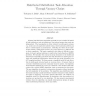Free Online Productivity Tools
i2Speak
i2Symbol
i2OCR
iTex2Img
iWeb2Print
iWeb2Shot
i2Type
iPdf2Split
iPdf2Merge
i2Bopomofo
i2Arabic
i2Style
i2Image
i2PDF
iLatex2Rtf
Sci2ools
106
click to vote
ICRA
2003
IEEE
2003
IEEE
Multi-robot task-allocation through vacancy chains
Existing task allocation algorithms generally do not consider the effects of task interaction, such as interference, but instead assume that tasks are independent. That assumption is often violated in multi-agent systems, e.g., in the case of cooperative mobile robots, where interaction effects can have a critical impact on performance. Modeling the effects of the interactions within a multi-agent system, the group dynamics, is difficult due to their complexity. The same complexity also makes it difficult to program, by hand, optimal solutions to multi-robot task allocation (MRTA) problems. We formalize the concept of group dynamics in the traditional framework of scheduling and show that task allocation in multi-agent systems with significant performance effects from the group dynamics is an NP-complete problem. We then present a simplified model of task allocation in multi-agent systems based on vacancy chains. A vacancy chain is a resource distribution process commonly found ...
| Added | 04 Jul 2010 |
| Updated | 04 Jul 2010 |
| Type | Conference |
| Year | 2003 |
| Where | ICRA |
| Authors | Torbjørn S. Dahl, Maja J. Mataric, Gaurav S. Sukhatme |
Comments (0)

